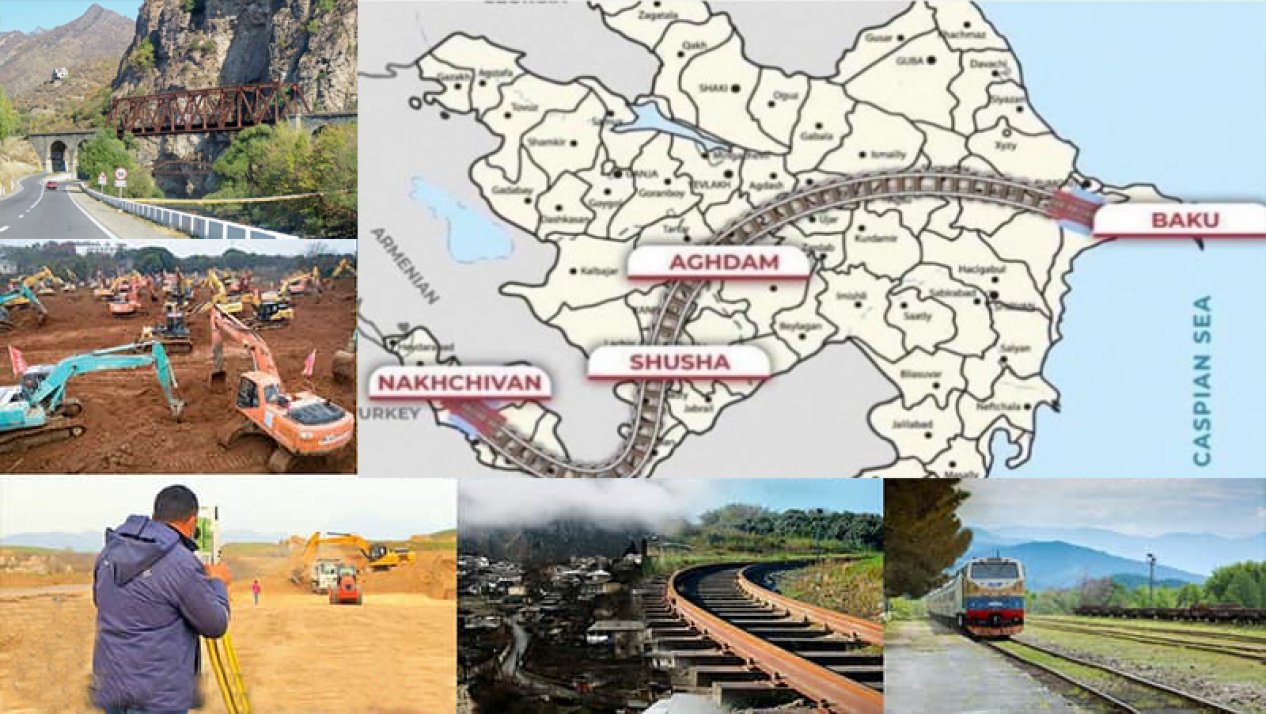
So, just a few days ago, Azerbaijan and Iran signed a "Memorandum of Understanding on the creation of a new transport corridor connecting the East Zangazur economic region and Nakhchivan." According to experts, the new corridor is a new term in transcontinental transit, which will change the political and transport map of the region. The new railway and multi-lane highway will not only connect the geographic regions of Azerbaijan, but will cover a more expansive and global geographic area. Thus, this transport corridor will become an integral part of the regional transport and logistics structure linking East and West, Europe and Asia.
Undoubtedly, the new corridor will again leave Armenia on the sidelines, and again it will be off the regional routes. Moreover, playing with the issue of the Zangazur corridor, which was supposed to pass through Meghri and provide land communication between Nakhchivan and Azerbaijan proper. Armenia believed that it could put forward conditions on all issues, and Azerbaijan would agree with Yerevan's illogical claims, since there were no other alternatives. And Azerbaijan decided to create an alternative corridor along the southern bank of the Araz River and thus implement the South Zangezur corridor.
Thus, Azerbaijan blocks Armenia's transport links with Georgia, Russia, Iran and Turkey. Currently, Armenia does not have a land connection with Russia, but Yerevan can use Zangazur corridor if it is launched. This means that Azerbaijan has also taken the key to the transport gates, which would ensure the connection of Armenia with Russia.
Azerbaijan has also thwarted the idea of an Iran-Armenia-Georgia transport union, which is one of Yerevan's biggest aspirations. We are talking about the Persian Gulf-Black Sea international transport corridor, which was supposed to pass through Armenia and reach the ports of Georgia. It is known that the project, initiated by the Islamic Republic of Iran in 2016, provided access to the Black Sea to Georgia through Armenia. In recent years, Iran has succeeded in convincing Tbilisi, and a preliminary agreement has been reached among government members. Former Iranian Foreign Minister Mohammad Javad Zarif also discussed the project with Georgian Prime Minister Giorgi Gakharia during a visit to Georgia last January. (Source)
Georgia, in turn, does not want to join the 3 + 3 format, claiming that the Zangazur corridor through Armenia would not bring economic and political dividends, and thinks positively about the creation of the Persian Gulf-Black Sea corridor.
On the other hand, Armenia has been working hard on creating this route. Over the past five years, Tehran and Yerevan have held more than ten meetings at the governmental level on this issue, and the first steps have been taken. However, after the heavy defeat of Armenia in the Second Karabakh War, the significant new realities created by Azerbaijan, as well as Baku's persistence in certain actions, reduced Iran's interest in the project. After Baku's active efforts and the announcement of the priorities of a new cooperation platform with Iran at the end of 2021, the situation began to change 180 degrees, and Tehran adjusted the Persian Gulf-Black Sea corridor, realizing that better and more effective agreements had been reached with Baku. Iran preferred a new version of this corridor, passing through Azerbaijan, not Armenia.
So, creating the Persian Gulf-Black Sea route through Iran, Azerbaijan and Georgia is already on the agenda. Considering that this corridor includes Bulgaria and Greece, it is more realistic and convincing that the Persian Gulf-Black Sea international transport and transit corridor will be expanded in the near future and become a regional route of global significance as a central link in the One Belt, One Road. (Source)
Apparently, Armenia has been kept out of the transit arteries for the last seven years. It is possible that Armenia will join this project in the future, but in all cases, since the transit line passes through the territory of Azerbaijan, Yerevan can only be the weakest link.
It is noteworthy that Georgia will join the new Zangezur corridor, as it is already in the same transport coalition with Azerbaijan, Iran and Turkey. And because this is the shortest and most convenient way to regulate Tbilisi's trade and economic relations with Iran.
Another critical factor is the gradual "separation" of Iran from Armenia. It is through Azerbaijan that Iran seeks to "forget" about Armenia, avoiding isolation in the pro-Western transport and logistics chain. In an effort to join the European family, Tehran did not miss this opportunity and pushed into the background the idea of other projects that are not important for it, such as the construction of an alternative road to the Gorus-Gafan highway. Although the construction of this road, which has a project cost of about $280 million, has been underway for several years, it has stalled. Iran must spend at least $150-170 million on the route, which Tehran basically does not need when access to the Black Sea through Georgia is fully secured.
As a result, Armenians will need the usual road, part of the Gorus-Gafan highway, passing through the Gubadli district of Azerbaijan, and they will suffer significant monetary losses, paying fees to the customs and transit posts of Azerbaijan in this region.
Consequently, official Baku thwarted all the plans of Armenia and ruined its expectations to earn millions of dollars. Yerevan will be completely blocked after Azerbaijan expands its land transport links with Turkey and Georgia through Iran.
In this regard, it would be naive to think that the Zangazur corridor, which should pass through Armenia, has gone down in history. This corridor is definitely on the agenda. From this point of view, Azerbaijan left the last choice to Yerevan. If Armenia agrees to the creation of the Zangazur corridor, it will be included in the regional platform of multilateral cooperation and will be able to enter the markets of Europe and Asia. Or it will remain outside of all regional projects and live in miserable political and economic isolation. The fate of Armenia is now in the hands of Azerbaijan.
Faced with tough Western sanctions, Moscow's need for Turkey, which wields enormous economic power in the region, will grow as its economic ties and transit lines with the European Union close. In the near future, China and India in the east and Turkey in the southwest may become close partners for Russia. The Turkish market is a vast platform for Russians, after which, of course, the dynamics of trade relations and the number of product categories will increase. From the point of view of logistics and transport services, air and sea transportation is unprofitable, due to the costs. The most convenient route is the railway and highway Nakhchivan-Kars-Istanbul, reaching Dagestan through the territory of Azerbaijan. The most profitable and cost-effective way to connect Russia with Turkey is the Zangazur corridor connecting Azerbaijan and Nakhchivan. The Armenian part of this corridor is effectively monopolized by Moscow, and the railways officially belong to it. Therefore, in the near future, Russia needs to build the Zangazur corridor to meet the dynamic demand and transport needs of relations with Turkey.
One more point. After the creation of the South Zangazur corridor, the Kremlin, together with Iran, its closest strategic ally, will also reduce the profitability of the North-South international route, the main transport route. Because from now on, Iran will prefer the East-West corridor. Thus, by attracting Iran to its global transport hub, Azerbaijan will also reduce Russia's dominance over the corridors in the region. As a result, Russia will once again increase its activity in the Zangazur corridor, involving Armenia, which has been driven into a corner, in order to maintain balance.
At present, Azerbaijan is directing Iran not only to the north, but also in the East-West direction. The most important example of this is the new energy projects that will ensure the integration of Iran into the West through Azerbaijan. An important turning point in this direction can be considered the trilateral agreement on the exchange of natural gas between Iran, Azerbaijan and Turkmenistan signed during the 15th Economic Cooperation Organization (ECO) summit in Ashgabat on November 27, 2021. (Source)
The agreement represents a new opportunity for cooperation between the three Caspian countries and can be considered as a legal basis for establishing a new format for the transit of energy resources in the region. According to the trilateral agreement, Iran will receive from 1.5 billion to 2 billion cubic meters of gas per year from Turkmenistan and supply the same amount to Azerbaijan. This is especially important for the Transcaspian region. Tehran is also interested in integrating its transport lines into Azerbaijan's existing oil and gas routes. Iranian Oil Minister Javad Owji said that Iran is ready to increase the volume of transportation of Turkmen gas through its territory. Iran has the required infrastructure for this. (Source)
The Iranian oil minister did not rule out the signing of new energy agreements between Iran and Azerbaijan, two members of the OPEC + coalition. This means that Iran considers it acceptable to transport oil from the Caspian Sea to Europe via the Baku-Ceyhan pipeline. The first steps in this direction were taken during the visit of former Iranian President Rouhani to Azerbaijan on March 28, 2018; a Memorandum of Understanding was signed between the Azerbaijani Energy Ministry and the Ministry of Oil of the Islamic Republic. (Source)
This document envisages the joint production and transportation of oil at the Alov and Shark fields. At the same time, it will play a vital role in the implementation of other energy projects in the future. Thus, given the new realities of the European oil and gas market, Iran prefers closer cooperation with Azerbaijan and seeks to transport its resources along the Trans-Caspian route, which is unanimously supported by the European Union. The extensive transport infrastructure of this corridor passes directly through the territory of Azerbaijan, and the Southern Gas Corridor has been operating since December 31, 2020. So, large-scale flows of oil and gas to Europe from the Caspian states, including Turkmenistan, can begin thanks to the Trans-Caspian-South Gas Corridor.
All these facts and commentaries were real indicators. The picture is this: Azerbaijan has demonstrated its unshakable will to create East-West railways in today's geopolitical conditions, just as it started the East-West energy corridor 28




















